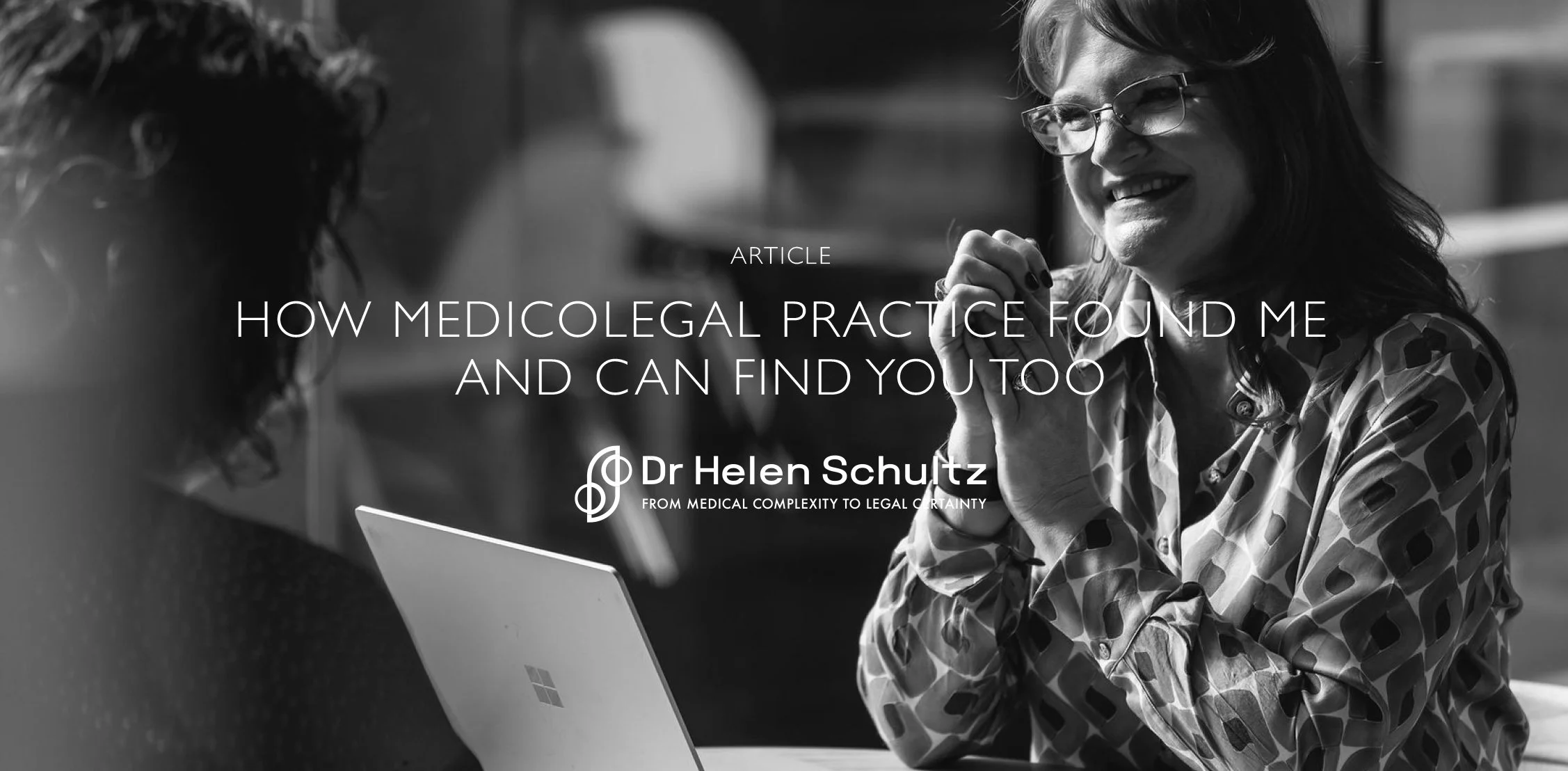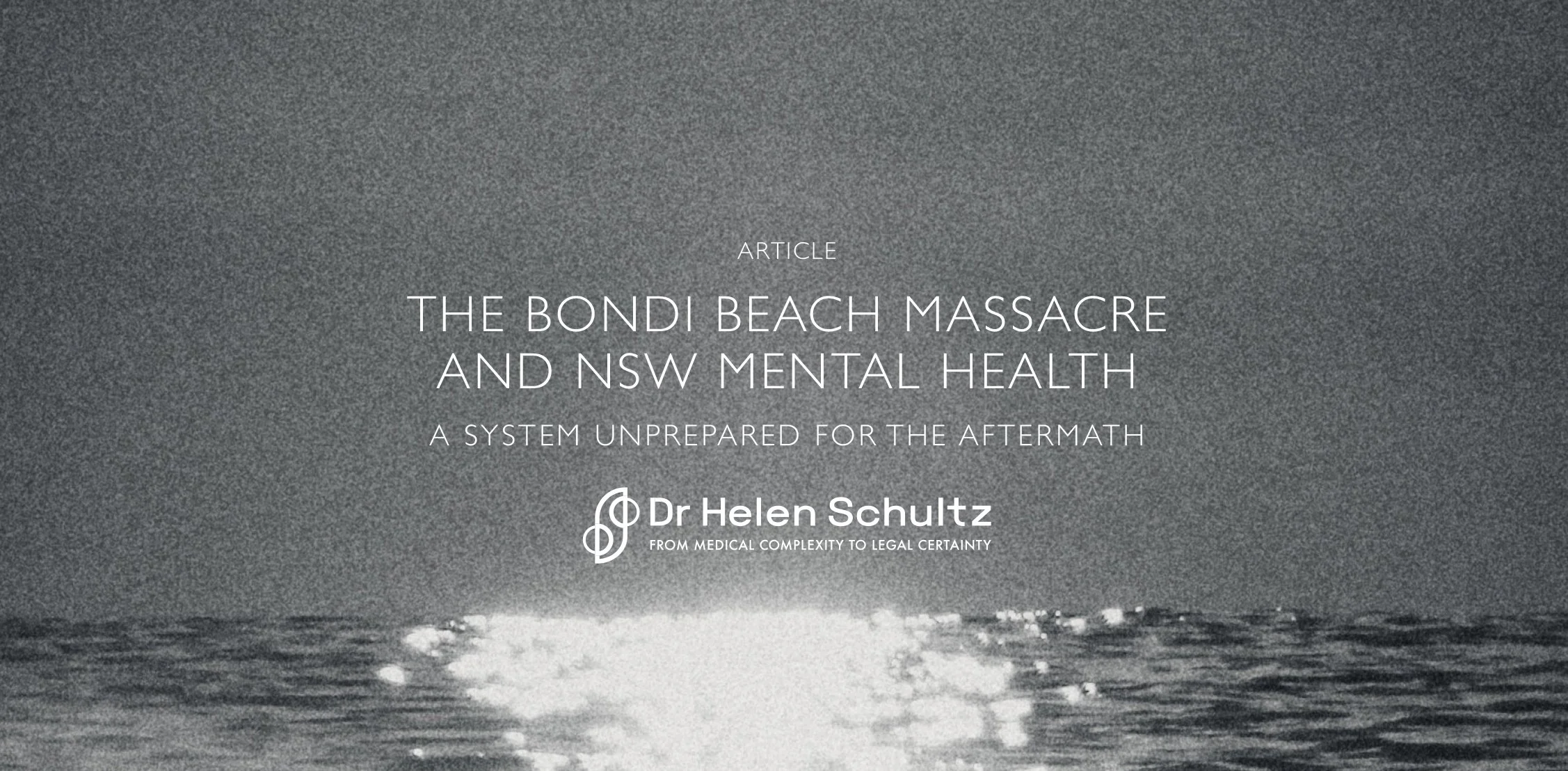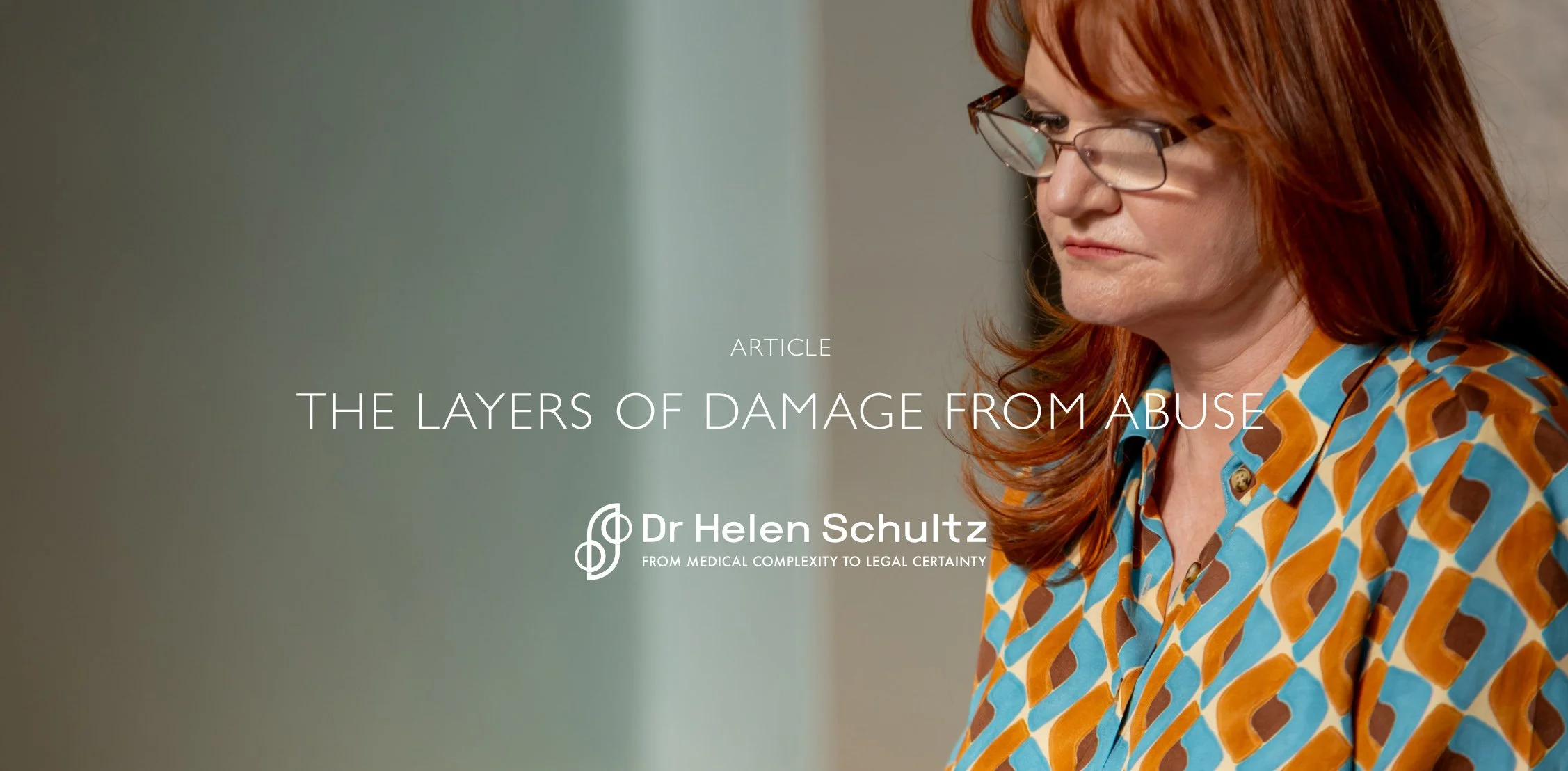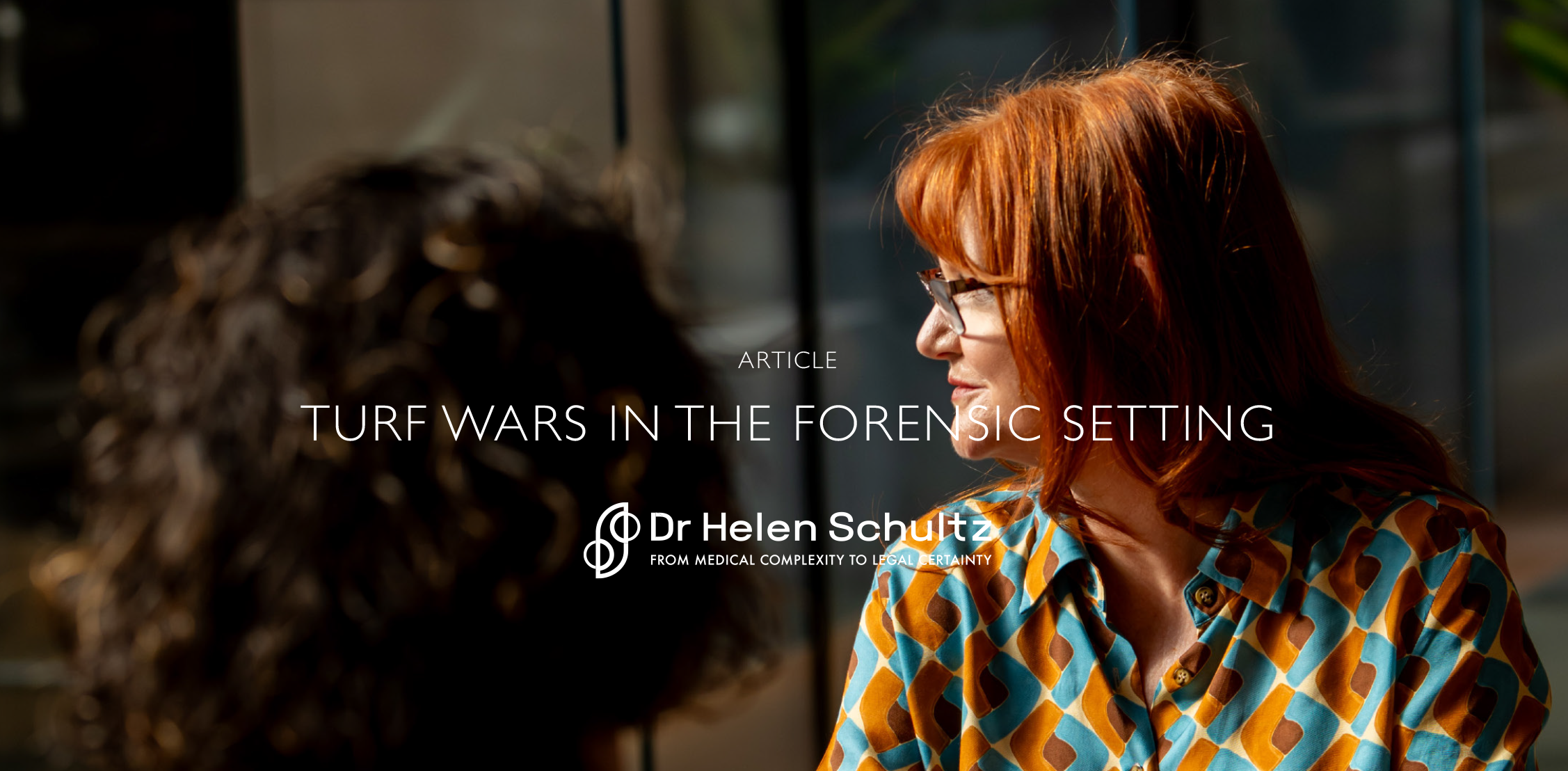Articles
How medicolegal practice found me and can find you too
The day-to-day grind of clinical psychiatry kept me distant from what intrigued me most about human behaviour and predicament. A redundant and overburdened system had little time for such depth. Medicolegal practice changed that entirely. It brought together psychiatric discipline with the art of written communication, delivering value to legal teams handling civil matters, personal injury claims, and historical abuse cases. Most importantly, it restored something that clinical practice had eroded - the recognition that psychiatric expertise genuinely matters.
The Bondi Beach Massacre and NSW Mental Health — A System Unprepared for the Aftermath
The Bondi Beach massacre has left a community reeling, yet the NSW mental health system tasked with supporting survivors was already deemed unfit for purpose before December 14, 2025. Lifeline recorded over 4,300 calls in the 24 hours following the tragedy—a crisis response that addresses immediate distress but cannot meet the longer-term therapeutic needs of those who will develop PTSD, experience exacerbation of existing trauma, or present with varied symptoms through substance use, anger, or disturbed sleep. Despite the IRC-mandated psychiatrist pay rise earlier this year, little evidence exists showing whether this has actually increased workforce capacity or reopened closed services. With the coronial inquest into the earlier Westfield Bondi stabbing revealing systemic failures, this article examines whether NSW Health can manage the overwhelming demand ahead—or whether this opportunity for proactive response will be missed, demonstrating once again that those with mental illness aren't supported when they need it most.
An unfiltered truth: The Consequences of Public Exposure to Graphic Trauma Narratives
Virginia Giuffre's memoir and the ongoing public consumption of Epstein-related content raise urgent clinical questions about uncontained trauma exposure. Material that would normally require multiple therapy sessions, professional supervision, and careful pacing is now consumed by millions without protective factors present. For the estimated one in four adults carrying unresolved childhood sexual abuse trauma, graphic narratives can reactivate neural systems, trigger flashbacks, and escalate suicidal thoughts—even without personal disclosure or recognition of their own experiences. This article examines why unfiltered public exposure to trauma material has population-wide psychiatric consequences and calls for ethical debate about releasing graphic content without genuine support structures for those inadvertently harmed.
Delays in the National Redress Scheme: Counting the Human and Economic Cost—and How to Fix It
As the National Redress Scheme enters its final three years before closure in June 2028, over 32,000 survivors remain waiting for application processing whilst only 17,800 payments have been finalised. These delays carry dual costs—economic burden through increased health system usage, productivity loss, and expensive civil litigation pivots, alongside profound human toll as uncertainty replicates the original powerlessness survivors experienced. The Parliamentary Joint Standing Committee's November 2024 inquiry provided practical recommendations including extending the Scheme beyond 2028 and surge funding to clear backlogs, yet implementation remains pending whilst survivors continue experiencing deteriorating mental health and the retraumatisation of institutional decisions made beyond their control.
One year on and the fallout from overturning Bird v DP
One year after the High Court overturned Bird v DP, the psychiatric impact on survivors of historical institutional abuse continues to unfold. The decision found the Catholic Diocese of Ballarat could not be held vicariously liable for a priest's actions because he wasn't technically an employee—a legal distinction that felt incomprehensible to victims who encountered their abuser solely through institutional authority. This article examines how legal setbacks reactivate original trauma by mirroring the same power imbalances survivors experienced during abuse, and why every delay in justice becomes part of the same story that began with institutional betrayal.
When Trauma-Informed Practice Meets the Medicolegal Process
Trauma-informed practice emphasises safety, choice, and collaboration, yet medicolegal psychiatric assessments are evaluative, time-limited, and operate within power structures that can reactivate trauma dynamics. The person being assessed has minimal control over the process, and questions probing inconsistencies can feel like disbelief. This article examines the inherent paradox psychiatrists face when conducting independent assessments of trauma survivors, exploring how trauma-informed awareness can be maintained within legal constraints without sacrificing professional rigour or court obligations.
Why Evidence Matters More Than Opinion in Psychiatric Medicolegal Work
Psychiatric opinions won't withstand court scrutiny unless grounded in solid evidence—both documentary and research-based. This article emphasises the importance of thoroughly examining treatment records, past assessments, and contemporaneous notes whilst citing high-quality research like the Australian Child Maltreatment Study. Building an evidence library and referencing credible studies strengthens opinions, reassures courts that conclusions align with the broader psychiatric evidence base, and elevates the standard of medicolegal psychiatry beyond personal belief or intuition.
Finding Confidence and Balance in Medicolegal Psychiatry [Every new medicolegal psychiatrist learns this the hard way]
New medicolegal psychiatrists face a critical tension between hedging defensively and trying to please referrers—neither approach serves the purpose of witness work. This article examines both traps through practical examples, demonstrating how to provide clear, reasoned opinions that acknowledge complexity without paralysis. The key lies in developing confidence to sit comfortably between science and law, anchored in evidence and committed to independent opinion rather than advocacy or appeasement.
Lawyers Want Definite Answers from Medicolegal Experts
Lawyers require definite answers from medicolegal psychiatric specialists, not because they want to pressure clinicians, but because the legal framework demands clarity that fits diagnostic thresholds and damages criteria. Unlike orthopaedic cases with objective imaging, psychiatric injuries are invisible and fluctuate over time, making causation rarely clean or linear. This article explores how psychiatrists can translate clinical nuance into legal clarity using the balance of probabilities standard, providing useful opinions that acknowledge complexity whilst still helping courts reach decisions.
NSW Psychiatry Wins for Specialists — But What about Trainees?
The NSW Industrial Relations Commission's decision to grant public sector psychiatrists a 20% pay uplift is a significant win for staff specialists, but it overlooks a critical component of the workforce—psychiatry trainees. These registrars shoulder after-hours work, emergency assessments, and daily clinical reviews that keep services running, yet they've been excluded from pay increases while facing mounting training fees and deteriorating supervision quality. Without addressing trainee retention and recognition, this temporary fix risks accelerating the workforce crisis it aims to solve.
From Numbers to Narratives: The Evolution of Medicolegal assessments for psychiatric injuries in Australia
The landscape of psychiatric compensation assessments in Australia has evolved from relying solely on whole person impairment percentages to embracing comprehensive narrative approaches. While rating scales like GEPIC and AMA Guides provided seemingly objective measurements, they often failed to capture the full impact of psychiatric injuries, particularly for survivors of historical abuse and complex trauma. Modern medicolegal practice now combines structured ratings with detailed functional assessments, recognising that the story behind the numbers is often more decisive in court proceedings.
What Makes a Good Medicolegal Report?
A comprehensive medicolegal report requires more than clinical expertise—it demands understanding of the legal framework and precise communication. This guide explores essential elements that make medicolegal reports valuable to legal proceedings, from answering questions directly and avoiding jargon to anchoring opinions in recognised diagnostic frameworks. Based on insights from a recent Royal Commission conference, these principles ensure reports effectively guide the legal process while maintaining professional independence.
The layers of damage from abuse
The psychological damage from abuse extends beyond the criminal acts to include the devastating impact of grooming behaviours designed to build false trust. Victims often struggle most with the manipulation that made them feel special before the abuse began, leaving lasting effects on their ability to trust and connect with others. This medicolegal psychiatrist's perspective explores the complex layers of trauma and the importance of understanding how predators exploit our fundamental need for human connection.
What's involved in engaging a medicolegal expert?
Understanding the proper referral process for medicolegal assessments is crucial as more individuals attempt direct engagement with experts during compensation processes. Independent medicolegal experts must be engaged through legal representation to maintain ethical impartiality and report validity. This article explores the professional protocols, panel selection criteria, and the importance of maintaining independence in psychiatric assessments for legal proceedings.
Turf wars in the forensic setting
Dr Helen Schultz examines the role of general adult psychiatrists in medicolegal practice, challenging professional barriers that limit access to essential independent medical examination services amid growing workforce shortages.
AI in Medicolegal Practice [Conference Reflections]
Navigating the complex intersection of AI technology and medicolegal practice requires expert understanding of both medical and legal frameworks. Our medicolegal consultancy provides clarity on emerging AI applications while ensuring compliance with professional standards and jurisdictional requirements.
Why Complex Legal Cases Demand Psychiatric Assessment Expertise
Historical abuse matters require sophisticated psychiatric assessment that goes far beyond standard impairment percentages. Psychiatrists bring unique rapport-building skills and deep understanding of trauma's impact on identity, relationships, and work capacity—essential for complex medicolegal evaluations in this growing field.
The unjust path to justice
The recent allegations of abuse in Melbourne childcare centres have revealed a devastating truth – our medicolegal system is failing the children who need it most.
Our system's reliance on 30-year-old impairment guidelines, shortage of qualified child specialists, and inappropriate assessment techniques creates barriers that may deny justice to those who need it most. These Melbourne cases present a critical opportunity for reform through urgent collaboration between medicolegal experts, legal professionals, and policymakers.
Without immediate reform, we risk failing another generation of abuse survivors.
Writing a Medicolegal Report and Answering the Three Essential Questions
Learn the systematic three-part framework for writing comprehensive medicolegal reports in historical abuse cases. Expert guidance on assessment planning, apportionment analysis, and defensible court opinions.
Writing Expert Reports for IMEs – Considering Best Practice When it Comes to the Purpose of the Report and the Intended Reader
Learn how experienced psychiatrists are refining their medicolegal report writing through peer review. Discover key considerations for structuring IME reports that serve both clinical accuracy and legal proceedings effectively.









![Finding Confidence and Balance in Medicolegal Psychiatry [Every new medicolegal psychiatrist learns this the hard way]](https://images.squarespace-cdn.com/content/v1/6065049af9be8c2c40e943a5/1760401208675-I4RJW5RFKD4L1112N7SM/Lawyers+Want+Definite+Answers+PART+2.png)







![AI in Medicolegal Practice [Conference Reflections]](https://images.squarespace-cdn.com/content/v1/6065049af9be8c2c40e943a5/1755234444636-X475TSNNCFJR0FS15I0E/AI+in+medicaoloegal+practice.jpg)



